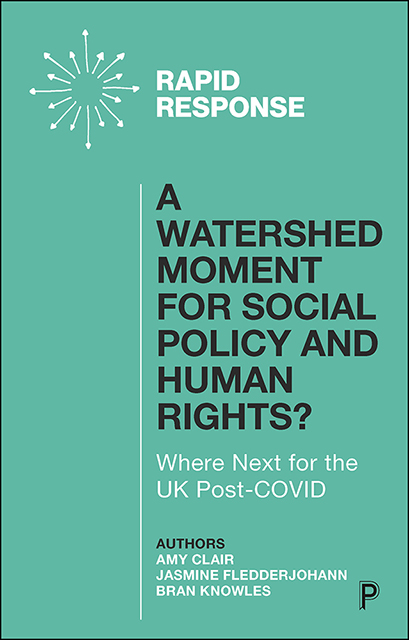1 - Introduction: Human rights, social policy and the COVID-19 pandemic
Published online by Cambridge University Press: 21 April 2023
Summary
The COVID-19 pandemic has caused unprecedented global disruption. In this book we explore what the pandemic has shown us about ideology, social policy, and human rights in Global Minority countries. We focus particularly on the UK and US, and on the policy areas of health, food, housing, and technology. The problems we discuss are inherently political – they have political causes and political solutions. For this reason, we focus on the political ideology that has shaped our policy landscape – neoliberalism – and countries that have pursued a neoliberal agenda to a great extent. We propose that ideological changes are an essential prerequisite for a well-planned, equitable, and just system going forward. Without such an explicit consideration of motivations and ideological underpinnings, future policies may fail in their goals, or, perhaps worse, set harmful and unethical goals.
COVID-19 is a timely and salient example of how some states have failed both to plan for a pending disaster and to equitably meet people's needs up to and throughout the disaster. As Illner (2020) cogently argues, framing disasters COVID-19 included – as sudden, unpredictable, and often ‘natural’ events which have disrupted an otherwise wellfunctioning system ignores the systematic marginalisation of people whose needs have been long-neglected by the state, and further obfuscates how that neglect led directly to disaster. In this view, disasters are not simply the result of external hazards – indeed, the ‘external’ nature of hazards themselves are subject to debate, as human action often directly or indirectly creates conditions for hazards – nor even of social risk factors in isolation; rather, inequitable social structures systematically devalue the lives and contributions of some groups of people, leaving these devalued people to bear the brunt of hazards with little to no state support, thereby creating disastrous social conditions. As Illner asserts, such structural inequities are only resolvable through largescale systemic change.
Social policy, evidence, and ideology: from human rights to neoliberalism and back again
The 1940s are often considered the beginning of a ‘golden age’ of social policy and human rights. Significant developments such as the Beveridge Report (in the UK), New Deal (in the USA), and Universal Declaration of Human Rights (UDHR) arose during this time.
- Type
- Chapter
- Information
- A Watershed Moment for Social Policy and Human Rights?Where Next for the UK Post-COVID, pp. 1 - 14Publisher: Bristol University PressFirst published in: 2023



